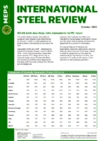Steel exempt from President Trump’s reciprocal tariffs
Steel imports into the United States will not be subject to further tariffs under new reciprocal rules unveiled by President Donald Trump.
It featured in a list of items – including copper, pharmaceuticals, semiconductors and certain critical minerals – that will be exempt from the new country-specific tariffs that will be fully implemented from April 9*. However, due to the recent revision of Section 232 regulations, steel joins vehicle imports in remaining subject to its own 25% US import tariffs.
Despite the steel sector’s avoidance of further direct tariffs, steel producers across the world will be affected by the impact on end-users. This will further subdue the demand for steel in countries where producers are already challenged by oversupply and increasingly tight profit margins.
US tariffs to reduce exports of ‘almost all manufactured goods’
MEPS’s US steel market analyst, Laura Hodges, said: “The tariffs announced yesterday do not directly apply to US steel markets. However, an upward steel price impact from the automotive tariffs effective from April 2 will be felt, particularly in the near term. The US currently imports nearly 50% of its vehicles. In the near term, automotive production can be expanded and capacity restarted, lifting domestic steel demand and prices.
“On the other hand, the reciprocal tariffs will reduce exports of almost all manufactured goods to the US, reducing steel demand in our major trading partners, lowering global steel prices and increasing the steel price gap between the US and the rest of the world.”
The lowest rate of reciprocal tariff announced by President Trump is 10%. This applies to trade partners including the United Kingdom, Brazil, Australia, Singapore and Ukraine. The EU attracts a 20% rate, while Japan attracts 24% and India 26%.
The highest reciprocal tariff to be applied by the Trump administration is the 50% rate applied to Lesotho. Among the other countries to attract high tariffs are Vietnam, 46%; China, 34%; Taiwan, 32%; and Indonesia, 32%.
Steel market participants in Europe and Asia were already concerned about the effect of recently imposed 25% US import tariffs applied to vehicles and parts produced by the automotive sector – a key steel consumer.
US Census Bureau data shows that USD214 billion in passenger cars and USD192bn in vehicle parts were imported from Mexico in 2024. Furthermore, automotive imports totalled USD54.4bn from Japan, USD49.4bn from South Korea, USD46.8bn from Canada and USD35.5bn from Germany last year.
President Trump’s bid to revive US manufacturing
Announcing his reciprocal tariffs plan outside the White House this week, President Trump said that increased tariffs would aim to revive the United States’ manufacturing sector.
According to 2023 United Nations data, US manufacturing output as a share of global manufacturing output was 17.4%, down from a peak in 2001 of 28.4%, a White House statement said.
President Trump’s statement added: “I have declared a national emergency arising from conditions reflected in large and persistent annual US goods trade deficits, which have grown by over 40% in the past five years alone, reaching USD1.2 trillion in 2024.
“This trade deficit reflects asymmetries in trade relationships that have contributed to the atrophy of domestic production capacity, especially that of the US manufacturing and defence-industrial base. These asymmetries also impact US producers’ ability to export and, consequentially, their incentive to produce.”
*On April 9, President Trump delayed the implementation of the higher rate "reciprocal" tariffs detailed in this article for a period of 90 days. Instead the base tariff of 10% was applied to goods imported from 60 countries.

Source:
International Steel Review
The MEPS International Steel Review is an essential monthly publication, offering professional analysis and insight into carbon steel prices around the world.
Go to productRequest a free publication





